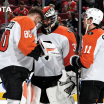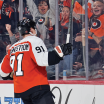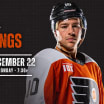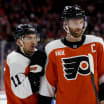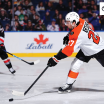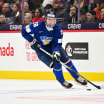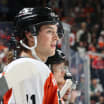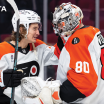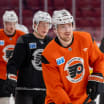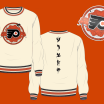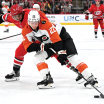Hockey's version of the Cold War reached a pinnacle in the 1970s. Team Canada's narrow victory at the legendary Summit Series in 1972 only heightened the animosity and that had been between brewing between the powers-that-be in North American and Soviet hockey.
During the 1975-76 season, the rivalry was renewed again. Two Soviet club teams - the legendary Red Army (CSKA Moscow) squad and the highly skilled, but slightly less formidable Soviet Wings (Krylya Sovetov) - toured North America and played a series of four games apiece against NHL clubs.
By far the most anticipated matches were those pitting the Red Army against the Montreal Canadiens and the two-time defending Stanley Cup champion Philadelphia Flyers. Although technically exhibition games, the teams approached the matches with the same sort of focus and intensity usually reserved for the Stanley Cup playoffs.
The final game of the Soviets' tour was played at the Spectrum on January 11, 1976. Entering the contest, the Red Army was undefeated. CSKA had thumped the New York Rangers at Madison Square Garden by a 7-3 score, played to a thrilling 3-3 tie at the Montreal Forum against the Canadiens and downed the Boston Bruins by a 5-2 count.
There was a lot at stake entering the final game. The Flyers were not only defending their status as the NHL's preeminent team, they also found themselves in the unaccustomed position of representing North American hockey in general and the NHL in particular. Philly was the NHL's last and best hope for defeating the Red Army.
TODAY IN FLYERS HISTORY: January 11
Flyers Conquer Red Army: January 11, 1976
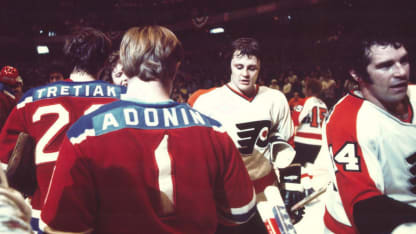
On the other hand, if CSKA could complete an undefeated gauntlet of games with a win over the Flyers on Spectrum ice (where Philly won a staggering 36 of 40 games in 1975-76, with two ties), the Red Army could rightfully claim to be the best team in any league in the world.
"They didn't like us and we didn't like them. So we were ready for a war," said Flyers Hall of Fame left winger Bill Barber.
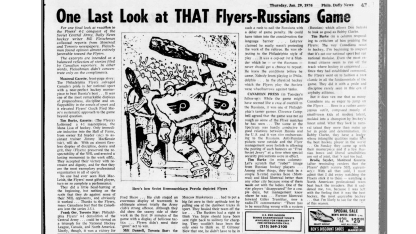
Combating the mighty Red Army
For more than a quarter century, there was no team in the world that was more decorated than CSKA Moscow. Not even the very best Montreal Canadiens clubs won as often and as convincingly as the Red Army teams of this era.
Formally called the Central Soviet Sports Army Club, they were better known to most in North America as the "Red Army" club. CSKA players comprised the vast majority of the Soviet national team that dominated international competitions. Within the Russian league, the club won 32 championships in 46 years. It also won 20 European Cups.
Like every squad iced by CSKA, the 1975-76 version was stacked with the best talent the Soviet Union had to offer. In goal, the team boasted the legendary Vladislav Tretiak in the prime of his career. Up front, the club featured the high-scoring likes of Boris Mikhailov, Valeri Kharlamov, Vladimir Petrov, Viktor Zhluktov, Vladimir Popov and Boris Alexandrov. The back line was equally deep, led by offensive defenseman Alexander Gusev, Vladimir Lutchenko, Gennady Tsygankov, Viktor Kuzkin, and Alexei Volchenkov. A 17-year-old Slava Fetisov made his debut that season as well.
Although technically enlisted men in the Russian military, the Red Army players' only job was to practice and play hockey. They were together virtually seven days a week, 12 months a year, with only short respites. As a result, CSKA was viewed as the world's most finely tuned hockey machine, executing plays with staggering precision.
Of course, the Flyers had plenty of talent of their own. While most of the media attention focused on the club's "Broad Street Bullies" image of roughhouse play, the team had an outstanding nucleus with three future Hall of Famers in captain Bobby Clarke (30 goals, 119 points in 1975-76), linemate Bill Barber (50 goals, 112 points) and two-time defending Vezina Trophy and Conn Smythe trophy winning goaltender Bernie Parent.
Beyond this trio, the Flyers had one of the most dangerous snipers of the era in Reggie Leach (61 regular season goals, 91 points, plus a record 19 playoff goals on his way to the 1976 Conn Smythe Trophy), five time all-star defenseman Jimmy Watson, and former 50-goal, 100-point scorer Rick MacLeish. In all, the Flyers had eight players who tallied 20 more goals that season.
Add to the mix the Flyers' hard-hitting style, two-way play, intimidation tactics and the NHL's hardest-working group of role players and you had a club that was richly deserving of its stature at the time.
Unfortunately, the Flyers were without the services of Bernie Parent when the Red Army came to town. The goalie was suffering with a pinched nerve in his neck, which required surgery and limited him to 11 regular season games. Backup goaltender Wayne Stephenson stepped in to take Parent's place.
Even in Parent's absence, the Flyers had had a secret weapon. No person in North America had a more detailed understanding of the Soviet hockey style than Flyers' head coach Fred Shero.
The Fog behind the Iron Curtain
Shero, whose parents fled Russia for Canada to avoid religious persecution, was a dedicated student of Russian hockey. Even during the days when the Iron Curtain was firmly in place, Shero traveled to Russia on several occasions during the NHL off-season to study the Soviet style of play.
"The Fog" struck up an unlikely friendship with Anatoli Tarasov, the "father of Russian hockey." Shero and Tarasov developed a strong admiration for one another and spent time together in Moscow sharing bottles of vodka and comparing notes on their respective hockey philosophies, even though neither could speak the other's language.
"It was a perfect friendship, because Tarasov spoke no English and neither did Freddie," quipped longtime statistician Bruce "Scoop" Cooper, alluding to Shero's famously taciturn nature and cryptic pronouncements.
Shero borrowed several ideas on practice methods and game tactics from the Soviets and adapted them to the NHL setting. For example, Shero brought back from Moscow a three-man passing drill which simultaneously utilized three pucks, rather than one. Much of the system that Shero drilled into his Stanley Cup champion Flyers was a combination of hand-picked North American and Soviet tactics from which Shero created his own set of rules.
Flyer wingers were required to stay on their assigned wing between the blue lines, except if they had a chance to intercept a stray pass from the opposition. No forward was allowed to turn his back to the puck at any time and the only time a defenseman was allowed to do so was to quickly swing to a defensive corner. Blind centering passes in the offensive zone were forbidden.
Shero organized the team's defensive zone coverages to prevent the chance of being outnumbered, whether along the boards, in the slots, or up high. Diagonal passing in the defensive zone was forbidden as was skating the puck backward in the defensive end. It was acceptable for players to pass backwards in the defensive zone.
Where Shero disagreed the most strongly with the Soviets was his view on checking. Rather than relying on the sweep check, Shero encouraged his players to get a good angle on the opponent and take the body. Of course, "Freddie the Fog's" Flyers had one other pet tactic that was decidedly different from anything he had learned on his Russia excursions.
The longtime minor-league coach and former amateur boxer did not shy away from Conn Smythe's "if you can't beat 'em in an alley, you can't beat 'em on the ice" school of hockey thought. Shero's Broad Street Bullies were the most penalized and the most despised team in the league. With so much attention being paid to the brawling and taunting the Flyers engaged in, a little extra operating space was opened up for Philly's skill players.
To prepare for the game against CSKA Shero devised a plan to counterattack the Red Army's precision passing game. His team simply wouldn't chase the puck and would instead protect their blue line and bottle up the passing lanes. To avoid CSKA's deadly counter-attacks, Shero instructed his forwards to hold the puck as much as possible when they were in the Red Army's end of the ice.
"Freddie said 'We'll show them a real Iron Curtain' before the game, and that's exactly what we did," former Flyers defenseman Joe Watson recalls.
Tensions mount on and off the ice
With the Red Army still undefeated against the NHL's top teams and the Soviet Wings posting a 3-1 record in their portion of series (the only blemish was a 12-6 pasting by the Buffalo Sabres), the Flyers found themselves in the unfamiliar position of receiving support from fans in other NHL cities.
"We were in Toronto for our last road game before we came back to play the Soviets. Remember, the fans in Toronto hated us. We won that game (7-3), and we got our usual reception from the crowd. But as we left, those same fans were cheering for us to beat the Russians," says Watson.
The Flyers players needed little encouragement to get motivated to play the Soviets. Clarke, who was a catalyst for Team Canada at the 1972 Summit Series, already knew what to expect. He had earned the enmity of the Russians for a two-handed slash on star forward Valeri Kharlamov, but also won their grudging respect with his playmaking ability.
Even before the Red Army arrived in Philadelphia, the Russian players and hockey leaders were well aware of the rough-and-tumble reputation of the "Broad Street Bullies." A Pravda cartoon portrayed the Flyers as a bunch of Neanderthalic thugs wielding clubs instead of sticks. Clarke's reputation was already cemented in their eyes, but they also looked warily at the entire Flyers team. The Flyers, meanwhile, viewed them with equal distrust.
A "goodwill" get-together the night before the game was fraught with tension. There were few smiles and virtually no interaction between the two sides as they dined in the same room. Red Army coach Konstantin Loktev and Shero shook hands without speaking or making eye contact. The players didn't mingle at all.
"They stared at us, and we looked right back at them," Barber said years later.
Legendary Flyers announcer Gene Hart, who spoke Russian fairly fluently, taught Flyers president Ed Snider a phrase in Russian wishing the best for both teams in the upcoming game. But when Snider took to the podium, he spoke tersely and omitted the phrase.
Snider later said, "When I looked over at all those cold faces on their side glaring at us, I just couldn't do it."
Finally, the night of January 11 arrived. There was an electric atmosphere at the Spectrum, reminiscent of the last two Stanley Cup Finals. The ever passionate and rowdy Flyers fans greeted the visitors with a true Philadelphia welcome - boos and invective cascaded down on the CSKA players as they stepped on the ice surface. The Flyers, of course, received their usual raucous reception.
The house lights were dimmed for the player introductions as spotlights honed in on the players. Befitting the significance of the occasion, the Flyers played a recording of Kate Smith's rendition of "God Bless America," as the Spectrum crowd of 17,007 loudly joined in the singing both as an expression of patriotism and as a means of supporting the Flyers. Finally, Stephenson and Tretiak skated to their creases and the skaters got ready for the opening faceoff.
The Red Army controlled the opening faceoff and began to pass the puck from player to player as they circled and weaved around the perimeter. Heeding Shero's advice, the Flyers players refused to play chase. Instead they bottled up the neutral zone and did not allow the CSKA attackers to gain any speed as they attempted to penetrate the blue line.
"You can have the puck between the blue lines all night long but it won't do you any good if you can't get it in. We could let them do it all game and still beat them," said Clarke.
The Flyers soon took control of the puck-possession battle, as they bumped the CSKA players off the puck in the corners and easily won the forechecking battles. Clarke and Mel Bridgman also dominated in the faceoff circles, giving Philadelphia instant puck possession.
Philadelphia generated most of the good early scoring chances, and outshot CSKA by a 12-1 margin over the first 10 minutes. Only the stellar goaltending of Tretiak kept the game scoreless. Midway through the period, the Flyers killed off Moose Dupont and Ed Van Impe penalties to maintain the 0-0 score.
The Flyers stepped up their hitting game in the waning seconds of the Van Impe penalty. Dupont threw a big check on Mikhailov at the Flyers' blue line and then Barber crunched a Red Army defenseman in the offensive corner. Stepping out of the bench onto the ice, Flyers defenseman Ed Van Impe picked up a head of steam. Making a beeline in open ice for Kharlamov, the veteran blueliner leveled the scoring ace with a heavy body check at the 11:21 mark. Kharlamov laid on the ice as the CSKA bench screamed in protest, claiming that Van Impe had his elbows up as he delivered the check.
"He had his head down. When he looked up to see where the puck was, I hit him. I hit him on the side of the head with my shoulder. It was perfectly legal. There was no reason why he should have stayed down. It was an act," Van Impe said after the game.
Loktev summoned his players to the bench, yelling in Russian and gesturing at referee Lloyd Gilmour. Through an interpreter on the bench, Gilmour was given an ultimatum to either assess an elbowing penalty to Van Impe or the CSKA players would not return to the ice. The referee maintained that Van Impe's check was clean and told Loktev that he would assess a delay of game penalty on CSKA if he did not send his players back out immediately.
In response, Loktev motioned for his players to follow him and the Soviet officials to the visiting locker room. The Spectrum crowd booed and taunted (as the arena's famous "Sign Man" broke out a placard reading "Tell it to the Czar").
The Flyers players stood around in confusion as the Red Army players left the ice. Shero stood stoically behind the Flyers bench.
"I've seen them do that before," the Flyers coach said afterwards. "It's a tactic they use sometimes when the game isn't going their way. They always come back."
Shero may have been convinced that CSKA would come back, but few others were sure. In the bowels of the Spectrum, NHL president Clarence Campbell, Snider and NHLPA director Alan Eagleson held a heated discussion with Loktev and Soviet delegation head Viacheslav Koloskov. Snider angrily told the officials that the Soviets wouldn't get paid a cent for the tour if they didn't return to the ice.
The Soviets continued to stall. As a condition of their return to the ice, Koloskov attempted to negotiate a penalty on Van Impe or a cancellation of their own delay of game penalty. The NHL delegation conceded nothing. Finally, after a 16-minute delay, CSKA returned to the ice.
Flyers Seize Control
It took all of 17 seconds on the ensuing power play for the Flyers to grab the lead. Reggie Leach deflected a Bill Barber shot from the point past Tretiak, as the Spectrum erupted. At the 16:37 mark, MacLeish (who fired a game-high nine shots on goal) beat Tretiak cleanly with a wrist shot to make it a 2-0 game. After the first period, the Flyers had outshot CSKA by 17-2 margin.
Early in the second period, the oft-penalized Dupont returned to the box on a hooking minor. Rather than sitting back, the Flyers went to the attack. In a rare foray deep into the offensive zone, Joe Watson found himself alone in front of the CSKA net. The former curler then swept home a Don Saleski rebound on the backhand to give the Flyers a 3-0 lead at 2:44 of the middle stand.
"Freddie told me I had set back Russian hockey twenty years with that goal," laughs Watson, who says that he still gets asked about that goal more than any other single play in his career. "It wasn't a fancy goal, but it was a big moment for me."
Midway through the second period, CSKA finally broke through. Viktor Kutergin got loose to tuck the puck in the net at the 10:48 mark. But the Red Army wasn't able to draw any closer, as the Flyers went off leading 3-1 after two periods, with a 31-10 shot advantage.
In the third period, the Flyers asserted their dominance and controlled virtually every facet of the game. The Soviet squad rarely got much past the red line with the puck. At the 4:01 mark, young Flyers defenseman Larry Goodenough converted a Clarke feed to rip a shot home and give Philly a virtually insurmountable three-goal lead on home ice.
MacLeish generated two more good scoring chances as the period progressed but Tretiak made tough stops. He then robbed Leach of his second goal of the game from point blank range.
Even with the clock ticking down, Loktev refused to alter his team's style of play. When CSKA had the puck, they continued circling and weaving, looking for perfect scoring chances that just weren't there. The Flyers, meanwhile, fired 18 shots on Tretiak to finish with a staggering 49-13 edge in the category - and an equally lopsided advantage in scoring chances.
"If it wasn't for Tretiak, I think we'd have hit double figures," Flyers winger Gary Dornhoefer said later.
When the final horn sounded, the Flyers basked in a well-deserved standing ovation for playing a virtually perfect 60 minutes of hockey against their illustrious opponents. While CSKA complained that the Flyers played "animal hockey," many in the North American media said afterwards that the game proved the superiority of Canadian hockey over the Soviet brand.
The Flyers viewed the win as a reflection of the quality of their own team. At that time, the Philadelphia Flyers were the best hockey team not just in the NHL, but in the entire world.
"This doesn't prove Canadian hockey is better than theirs," Clarke said after the game. "It just means the Flyers are better than their best."
January 11: Through the Years
January 11: Flyers Birthdays

